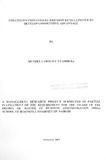| dc.description.abstract | This management research was undertaken so as to understand the strategies employed
in organizations to develop competitive advantage as well as the challenges this
organizations are faced with in their pursuit to be the best player in the industry. The urge
to conduct this research was due to the stiff competition in the telecommunications
industry in Kenya that has left Ericsson not shaken and still the industry leader for over
seven years now. Despite the competition, Ericsson has continued to be the leading
provider of telecommunications equipments in Kenya. Its performance has continued to
improve year by year, with over 70% of the telecommunications work currently being
carried out by this company. The objective therefore was to investigate and document the
various strategies employed by Ericsson Kenya Limited as well as the challenges and the
limitations the company faces in its pursuit to develop competitive advantage.
The study focuses on the telecommunications industry which is one of the most
competitive industries in Kenya today and has largely grown over the past ten years. The - growth in this industry is mainly due to government liberalization in the early 1990's that
saw other telecommunication companies venture into the market. Ericsson Kenya Limited
joined the competition as a telecommunication provider in 2002, and has largely grown
over the past seven years of its operations in Kenya. However, this industry is currently
being threatened by the extensive entry of mahy competitors, who are basically fighting for
the same customer. The survival of any player in this industry lies in coming up with
strategies to ensure the development of competitive advantage and come up with ways of
ensuring its sustainability.
v
The study aimed at collecting in-depth data and thus constituted a case study. The study
utilized both primary and secondary data. Primary data was collected by interviewing the
management and the departmental assistants. An interview was carried out with five top
management personnel including the company controller, project managers and other top
managers of each department. These managers are all experienced in corporate
management with outstanding international experience as they are all currently long term
assignment employees in Kenya but are Ericsson permanent employees in other
developed countries. Their purpose is to oversee the day to day running of the company
and therefore have good knowledge of the Ericsson operations and strategies. The data
analysis concentrated on the ideas, themes and strategies of competitive advantage by
Ericsson Kenya Limited and the challenges faced by this company at large. Data collected
was analyzed using content analysis and it involved a detailed description of items that
concerned the study.
The key findings on strategies applied by Ericsson to develop competitive advantage - include technological leadership, focus on operational excellence and strategic marketing,
customer intimacy, embarking on cost cutting measures, having a well defined human
resource management, clear communication and building a corporate image, and
investment in research and development. On the other hand, the challenges faced by this
organization include increased competition, customer failures, government policies, global
economic recession and cultural challenges. This study has several recommendations.
Initially, there is need for the company to train its employees on change and stress
management to avoid anxiety, panic and work related stressors. There is also need for
(
management to replace consultants with local employees and also recruit local staff to
high management positions for motivation. Finally, an intensive analysis of the customer is
necessary as the customer is critical for survival of the business.
However, the study had several limitations. Some of the top managers scheduled for
interview declined to participate and others only responded to a few questions as opposed
to the full interview guide leading to some inconclusive interviews. The managing director
who is new to the company was not interviewed as he felt that he was not the right
respondent. Finally, there is need to conduct research on more organizations in this
industry as well as those of related industries in order to shed further light on this important
area of academic discourse. This is mainly because different organizations differ in their
structures, systems, culture, objectives and resources. | en |

